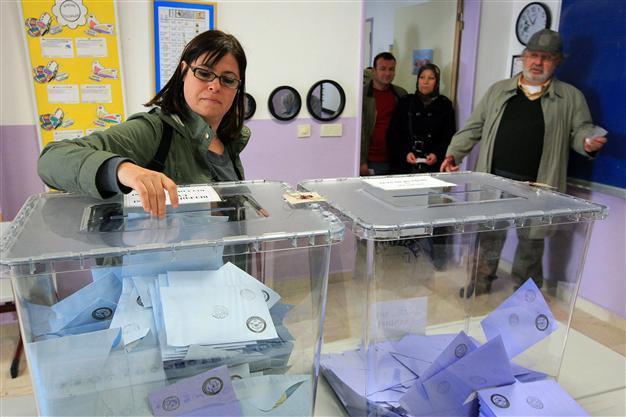Analysis: Gray votes crucial in Istanbul local elections
BEKİR AĞIRDIR ISTANBUL / Hürriyet

A woman casts her vote in Istanbul during the local elections in Turkey. In Istanbul, Kadir Topbaş successfully retained his seat after the elections. AFP Photo
The local election in Istanbul, Turkey’s biggest city that accommodates one fifth of the total population, did not become the stage of a major alliance of AKP opponents as had been expected.When the votes of the 40 percent segment (gray votes) that were outside the polarization in Turkey were distributed equally between the candidates of the ruling Justice and Development Party (AKP) and Republican People’s Party (CHP), the outcome ended up similar to previous elections. We can say that the winners of this election were both Kadir Topbaş (the Istanbul mayor) and Mustafa Sarıgül (the Republican People’s Party, CHP, candidate), who gained more votes than his party’s 2009 candidate Kılıçdaroğlu.
Istanbul’s demographics have changed over the past 10 years with the high rate of migration and fertility. This metropolis’ social and cultural texture is changing each year. Today, Istanbul’s sociologic, cultural and demographic features have become parallel to the national averages. For example, the rate of the Kurdish population is 15 percent among Turkey’s adult population, and it is also 15 percent in Istanbul.
Symbolic importance
Apart from the fact that one in every five voters reside in Istanbul, this metropolis has a symbolic importance in our political life. It is a city that the prime minister has a special interest in. The AKP’s crazy projects are designed for this metropolis. The AKP does not dare to lose this city.
The city also means the opening kick-off for social democrats and the CHP to start becoming an alternative for the government, to boost morale and to relive the day when they won elections here at a time when Bedrettin Dalan was at his strongest.
For this reason, public opinion focused on the candidates for Istanbul. The CHP decided on Sarıgül. His vote potential and the ever rising anti-AKP alliance were assumed to be enough to win Istanbul.
Three vital issues
In the polarization currently experienced in Turkey, the equilibrium between the anti- and pro-AKP sides is bigger as a rate and as a critical mass on the pro- side. The second factor is that it was not right to expect that 40 percent of the voters who are outside of the polarization would pile onto one side. It is not difficult to estimate that these “gray area” voters were distributed evenly on both sides. It was also not correct, as a third factor, that a nationalist and a Kurd, or a social democrat and a conservative, would unite under the umbrella of being anti-AKP.
Such a wide alliance did not occur in Istanbul. When district councils are taken into consideration, the AKP got 45 percent and the CHP got 36.5 percent. In the metropolitan mayoral vote distribution, the AKP got 47.9 percent and the CHP received 40.1 percent. As is seen, both parties had a three point increase in mayoral candidates.
Whoever won Turkey has won Istanbul first
One-fifth of Turkey’s voters are in Istanbul. It is said that whoever wins Istanbul also wins Turkey.
Topbaş made 90 campaign visits to 39 districts of Istanbul and participated in 20 TV shows. The CHP’s candidate, Sarıgül, went to 291 neighborhoods, entered 9,700 streets, held open-air rallies in 171 spots and met 226 NGOs and associations. He held 113 indoor meetings and contacted more than 4 million people one-to-one.
The People’s Democracy Party (HDP) nominated Sırrı Süreyya Önder for Istanbul and the Nationalist Movement Party (MHP) had a young candidate, Rasim Acar.
Istanbul’s districts: 25 to AKP, 14 to CHP
Meanwhile, there was almost a separate election in each district of Istanbul. The AKP had 26 of the 39 districts and the CHP had 13 before the elections.
The CHP was targeting at least 18 districts this time, but renewed its candidates in its strongholds of Kadıköy, Beşiktaş, Bakırköy and Şişli. At the end of the day, the AKP won 25 and the CHP won 14.
In Avcılar and Ataşehir, the CHP won easily with new candidates. In Maltepe, the strong candidate put forward by the AKP was not enough to break the CHP’s dominance.
The Üsküdar district was the stage of an exciting rivalry. According to unofficial results, the AKP candidate won with a very small margin.
Another district of fierce competition was Beyoğlu. The CHP’s female candidate Aylin Kotil caught a good wind in this district, but ultimately lost to incumbent Ahmet Misbah Demircan.
















